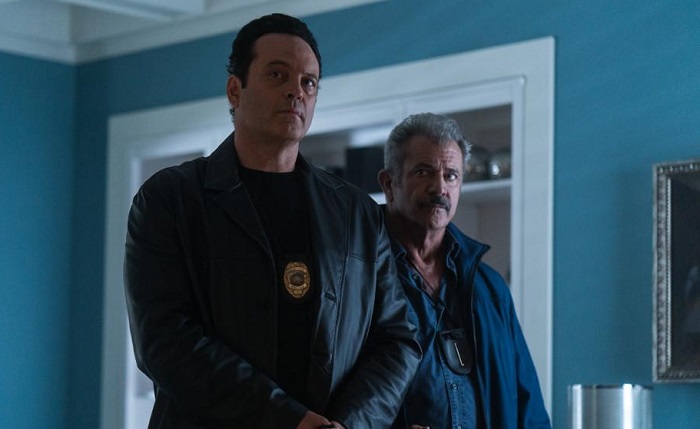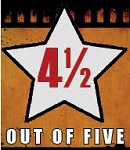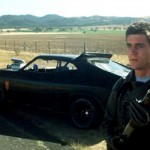

After two weeks that included a 13-film David Cronenberg retrospective, Drew Goddard's twisted Bad Times at the El Royale and David Gordon Green's formidable Halloween, Los Angeles' sixth annual Beyond Fest made a left turn for its closing night film without breaking its mission statement to bring sold-out crowds quality genre films.
With the horror Western Bone Tomahawk and the uncompromising Brawl in Cell Block 99, S. Craig Zahler has come into his own as a filmmaker with the stoic grit of Peckinpah and the effective simplicity of Carpenter. His third film, Dragged Across Concrete, made its debut in North America last Tuesday at Hollywood's Egyptian Theatre. At a colossal 158 minutes, it is his longest film to date, but it is also his best and most ambitious film, skewing closer to reality while keeping his pulpy strengths in fine form.
Set in Bulwark, an anonymous, decaying city with little opportunity, Henry Johns (Tory Kittles) struggles to make ends meet for the sake of his dysfunctional family, which includes his loving, quadriplegic younger brother and a prostitute mother. He agrees to take part in a bank heist with friend Biscuit (Michael Jai White), under the watchful eye of Eurotrash crime lord Lorentz Vogelmann (Thomas Kretschmann). Meanwhile, vice cops Ridgeman (Mel Gibson) and Lurasetti (Vince Vaughn, hot off his revelatory performance in Zahler's Brawl in Cell Block 99) are in similar dire straits. Ridgeman, stuck in the same rank for 27 years, must provide for Sara, his bullied daughter, and his wife Melanie (Laurie Holden), an ex-cop afflicted with multiple sclerosis. Lurasetti is about to propose to his girlfriend. When a drug bust that involves the beating and torture of a Latino man and his girlfriend gets caught on video and goes viral, Calvert (Don Johnson), their commanding officer, suspends them for six weeks without pay. Hard up for money, Ridgeman and Lurasetti stumble across Vogelmann's plot to deplete the bank's gold supply.
Despite the meticulous nature of the cops and criminals, best laid plans slowly freefall into a downward spiral. Zahler's films are built on the foundation of a slow burn, easing into the meat of the story while bolstering the characters. In Dragged Across Concrete, there is no white knight, nor is the concept of good and evil present. Cop or criminal, neither side has the ability to act with good intentions. Every decision is a short-term, impulsive victory with no favors to the theories of Isaac Newton.
Zahler plays with fire and lets it spread. Having us empathize with Henry's story is easy, but Ridgeman and Lurasetti are unreasonable on paper. They are white male rage personified, introduced while handcuffing a minority drug dealer's ankle to a balcony railing, then turning to his girlfriend, who is tormented with a cold shower while topless as they try to find the stash. It's this moment, in particular, that the ghost of Sam Peckinpah looms long, as does the grime of 1970's Italian crime films — the end result feels like what Heat would look like as a poliziotteschi film.
Objectively, in the time of Trump and dozens of racially motivated police shootings gone unpunished, Ridgeman and Lurasetti are the villains. However, we learn that this is not quite the case. Calvert, Ridgeman's partner, delivers the reality check in suspending them. However, it's the glimpses into their personal lives — especially Ridgeman — that force the viewer to accept the harsh realities of not only their get-rich-quick ambush but their duality as caring humans and extrajudicial tyrants. Dragged Across Concrete does not currently have a U.S. release date. When Summit Entertainment dates the film, however, impatient viewers unwilling to concede to Zahler's borderline apocalyptic worldview are in for a rude awakening.
What Dragged Across Concrete most sorely lacks is a moral compass, which is a wonderful thing. This is the buddy cop movie from hell, a skid row where pathetic opportunists represent the law and can't outsmart the criminals. Like Bone and Brawl, Concrete is a savory slow burn, but this lacks protagonists you could sympathize with. In particular, Gibson, as a tired, aging brute who refuses to abide by changing social norms, plays Ridgeman as a bitter mirror image to Martin Riggs, the cowboy cop that he carried through four Lethal Weapon films. One guilty move away from becoming his demons, it's an extraordinary opportunity for him to use the role of a police officer as an allegory for his own public image. Even separated from that analysis, Gibson delivers his best performance since Braveheart.
Dragged Across Concrete revels in escalation, firing short bursts of ultra-violence before the film spotlights grisly, unpleasant brutality that would be unceremoniously given away in an issue of Fangoria, including one moment that was so disgusting I had to watch it through my hands — and this comes from a person whose favorite book in American Psycho. Despite these disturbing interludes and sequences, they are earned in submerging us into the ruthless, cruel city of Bulwark. Concrete manages to make recent nihilistic crime thrillers like Sicario look like an episode of Sesame Street, echoing the fatalism of neo-noir masterworks like To Live and Die in L.A. and Dead Presidents.
Much as its characters learn in the hardest, most painful way possible, Dragged Across Concrete is not easy money. The challenge is in accepting life's unequal treatment of humanity, but it is not a condescending education — a mistake commonly made by filmmakers who try to tell viewers that life is not fair. The complexity and scope of Concrete stop that mistake in its tracks, solidifying Zahler as one of cinema's most composed storytellers.











